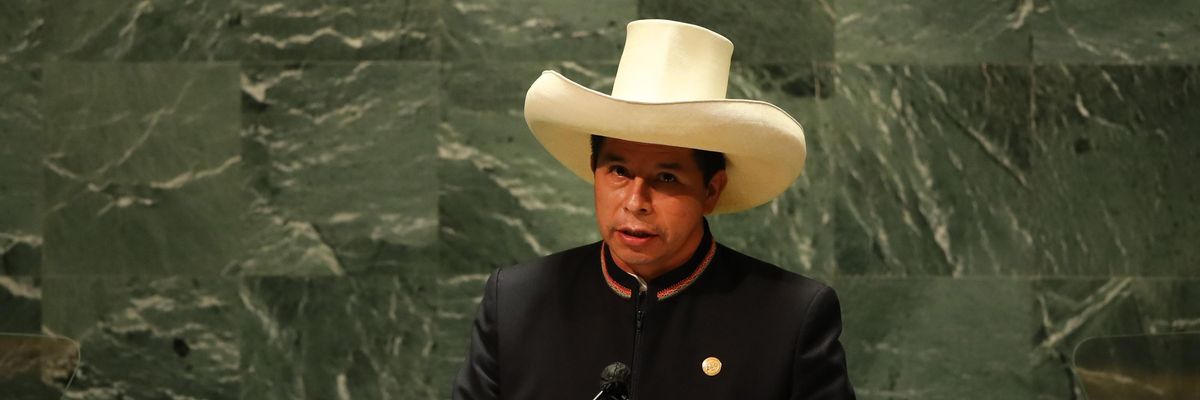Peruvian President Pedro Castillo--the leader of the country with the highest Covid-19 mortality rate in the world--is calling for an international agreement between nations and pharmaceutical companies to ensure equal, universal access to the coronavirus vaccine in an effort to combat massive inequities in distribution.
In his remarks at the United Nations General Assembly in New York this week, Castillo argued that the fight against Covid-19 has "demonstrated the inability of the international system to cooperate under the principles of efficiency and solidarity."
"The Global South demanded vaccine justice in stark terms at the U.N. today. This obscene inequality will not be forgotten quickly."
"We need agreements to ensure equity in access to vaccines," Castillo, who defeated a far-right opponent in Peru's June presidential election, said in his address to other world leaders.
To that end, Castillo proposed a global accord "between heads of state and the owners of patents to guarantee universal access to vaccines for all people on the planet, with no discrimination on the basis of privilege."
" Peru will be an active and dynamic member in the common task so that all countries have inclusive access to all diagnostics, medicines and vaccines, as well as technology and health products required in the response to Covid-19," Castillo said in his speech.
Thus far, major pharmaceutical companies have sold much of their vaccine supply to rich nations. According to an Amnesty International analysis released earlier this week, Pfizer and BioNTech have delivered nine times more vaccine doses to Sweden alone than to all low-income countries combined. Moderna has not delivered a single vaccine dose to a low-income nation, Amnesty found.
Peru has fully vaccinated just 29% of its population, and the country has been ravaged by the coronavirus pandemic, recording around 200,000 deaths to date. In May, the nation revised its official death toll dramatically upward--from around 68,000 to 180,764--after a scientific review of medical records revealed severe shortcomings in earlier data collection efforts.
The Lambda mutation of the coronavirus, currently classified as a "variant of interest" by the World Health Organization, was first identified in Peru and has since spread to dozens of countries.
Epidemiologists have long argued that leaving much of the world without access to vaccines heightens the risk of dangerous coronavirus mutations emerging and spreading widely, prolonging the pandemic everywhere. The Delta variant, now the dominant coronavirus strain across the globe, was first detected in India, which has struggled to vaccinate its population amid global supply shortages.
With nearly 8,500 people worldwide still dying each day from Covid-19, the leaders of other developing countries echoed Castillo's urgent call for vaccine equity during their remarks at the U.N. General Assembly this week. Ghana President Nana Akufo-Addo told the gathering on Wednesday that Africa is "suffering the worst brunt of vaccine nationalism."
"Ghana agrees with the call of the Rome Declaration of Global Health for voluntary licensing and technology transfers to boost vaccine production," he added.
But during a virtual coronavirus summit hosted by the U.S. on Wednesday, President Joe Biden focused primarily on vaccine donations, touting his administration's new agreement with Pfizer to purchase another 500 million doses to give away to other countries.
In a speech following Biden's remarks, World Health Organization Director-General Tedros Adhanom Ghebreyesus pointed out that "high-income countries have pledged more than 1 billion doses, but less than 15% of those doses have materialized." Just 2.1% of people in low-income countries have received at least one coronavirus vaccine dose, according to Our World in Data.
"We need an ironclad global commitment today to support the vaccination of at least 40% of the population of every country by the end of this year, and 70% by mid-2022," said Tedros. "To reach that target, we need 2 billion doses for low- and lower-middle-income countries, right now."
Nick Dearden, director of the U.K.-based advocacy group Global Justice Now, said following Biden's Covid-19 summit that "the Global South demanded vaccine justice in stark terms at the U.N. today."
"This obscene inequality will not be forgotten quickly," Dearden continued. "Charity isn't enough--only radical economic change will ensure it never happens again."




